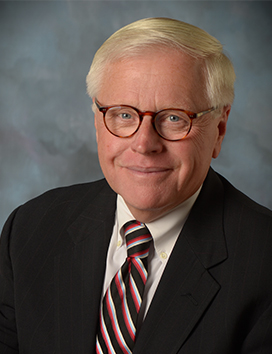You’ve likely seen him at industry events talking about how much he loves sales, and perhaps you’ve even been lucky enough to hand him a business card and get a $100 bill in return. Norcom Mortgage SVP of Reverse Lending John Luddy is a memorable personality to any reverse mortgage professional he comes into contact with, but he also has an interesting and unique journey into reverse mortgage origination.

As a second-generation funeral director, Luddy learned immediately about the value that comes with managing the emotions of what, at times, can be a difficult situation. Parlaying the lessons he learned in a very different industry into reverse origination, Luddy has become a very visible member of, and advocate for reverse mortgage products.
In the latest edition of RMD’s “Origins” feature, which charts the paths of originators into the business, Luddy recounts for readers what brought him to the reverse mortgage arena. He also shares some forward-looking thoughts about what the future of the industry may look like.
How long have you been originating both in general, and in reverse specifically?
36 years in general, and 15 years as a reverse only loan originator.
How did you first learn about the reverse mortgage product, and what led to you to believe that reverse origination was something you could do?
I was first introduced to reverse mortgages by a family member that got one, and it helped them out tremendously, so I knew then that I had to learn about them.
You came from a very atypical background for a reverse mortgage professional. How did you make the transition from being a second generation funeral director to becoming a mortgage loan originator?
I entered the mortgage business because I was friends with Bill McCue, who owned McCue Mortgage here in Connecticut. One day, he asked me to come to work for him, and I did. I must say that my experience in the mortgage business has been unique, and that I’ve never felt that I’ve had a bad day at work in 36 years.
Certainly, as a second generation funeral director, my time in that business has helped me in learning to manage the emotions of the transaction. In the forward world, when a first-time homebuyer is confronted with a home inspection and learn that their new dream house has termites in it, you needed to know how to keep people focused on the solution. The same is true with the reverse mortgages.
The need for a second appraisal can cause a client to go into a tailspin, and again, you need to manage the emotions with patience and empathy, which is akin to my experiences in the funeral business.
What would you say was your earliest big test that you found most challenging in your career as an originator?
To listen attentively and to not explain features of the program that a borrower can not avail themselves of.
What is your most unusual case that you’ve had to deal with in your capacity as an originator, and how did you solve it?
I had clients in which the husband was in a nursing home, he had [moved the] claim on the property to his wife, and then was conserved by probate court. I was the third lender they came to, because the prior lenders could not figure out the logistics involved in meeting HUD guidelines related to the counseling, loan and title requirements. I was able to structure it properly, and closed the loan as a result.
What would you classify as your biggest accomplishment in your work as a reverse mortgage originator?
I know that every reverse mortgage that I close is relieving an incredible financial hardship for the borrower, and which a lot of seniors face. The ability that we, as reverse mortgage originators have in dissipating that stress is my biggest accomplishment.
What do you think is needed for potential borrowers to be more fully educated about home equity release?
I personally do all of my reverse proposals and applications face-to-face with the client, so I know they are well-educated on the product. I believe all loan originators should do that, in order to fully educate their borrowers. By doing face-to-face appointments, I find that my clients are not shopping my proposals around, and my client withdrawal percentage is zero.
Where do you see the reverse mortgage industry in 5-10 years?
Based on our country’s demographics, I believe that the reverse mortgage industry will continue to grow, as long as the principal limit calculation doesn’t take another revision.
What is the industry’s biggest challenge today, and how can it be overcome?
The deeply-seated myths about them, and the ability of loan originators in explaining a complex financial product to clients with limited ability to grasp the details. It can be overcome by continuing to educate financial advisors, attorneys, loan officers, and clients face-to-face.
Complete the sentence: If I could change one thing about the reverse mortgage it would be: __________
To restore the principal limit to what it was prior to October of 2017.
If I could erase one reverse mortgage misconception it would be: __________
To ensure people know that the borrower is not signing their home away to the bank or to HUD, and they still have 100% ownership interest in the property.



